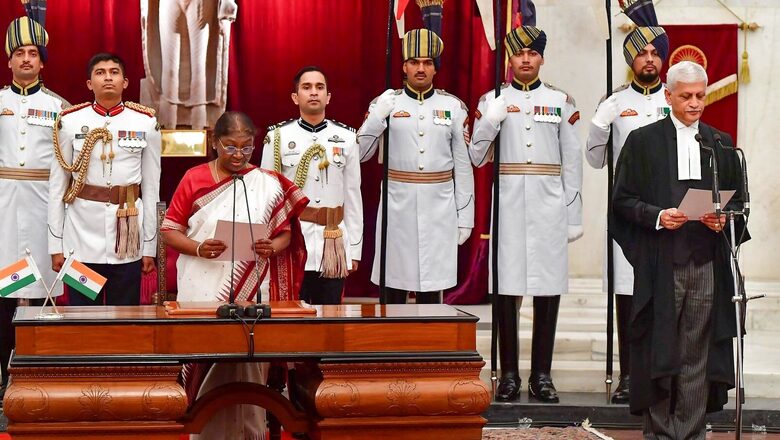
views
Much before India became independent, Justice UU Lalit’s grandfather Ranganath Lalit was a lawyer in Solapur. On Saturday, the former took up the mantle of his family legacy when he took oath as the 49th Chief Justice of India, with his father — who also had served as a high court judge — sitting in the audience.
As President Droupadi Murmu congratulated Justice Lalit following the swearing-in, what caught everyone’s attention was the new CJI’s gesture to touch the feet of his 90-year-old father, Umesh Ranganath Lalit, who served as a high court judge after a long career as an advocate in his home state Maharashtra.
Also present in the audience were Justice Lalit’s wife Amita Lalit, who runs a school in Noida, along with their two sons, Harshad and Shreeyash. While both of the sons studied engineering, Shreeyash Lalit later took up law. His wife Raveena is a lawyer too. Harshad Lalit works as researcher and lives in the US with wife Radhika.
As the CJI, Justice Lalit will have a tenure of 74 days and would demit office on November 8 on attaining the age of 65 years. He will be the sixth head of the Indian judiciary to have a tenure of less than 100 days. Justice D Y Chandrachud, the senior-most judge after Justice Lalit, is next in line to be the Chief Justice of India.
Born on November 9, 1957, in Maharashtra’s Solapur, CJI Lalit was witness to his father’s rise. UR Lalit was an Additional Judge at the Nagpur Bench of the Bombay High Court and a senior advocate at the Supreme Court.
CJI Lalit enrolled as an advocate in June 1983. He specialised in criminal law and practiced at the Bombay HC from 1983 to 1985. Following his stint at the Bombay HC, he worked in the chambers of then Attorney General of India, Soli Sorabjee, from 1986 to 1992.
He is known to be a part of several high-profile cases — from representing BJP leader and former Uttar Pradesh CM Kalyan Singh charged with contempt of court for failing to prevent the Babri Masjid demolition to appearing for actor Salman Khan in his 1998 poaching case.
In July, Justice Lalit headed the bench that sentenced fugitive businessman Vijay Mallya to four months’ imprisonment and fine of Rs 2,000.
He was also part of the five-judge bench which by a 3:2 majority judgment, in August 2017, “set aside” the centuries-old practice of instant triple talaq.
In November 2021, an SC bench headed by him quashed the two judgments of the Nagpur bench of Bombay High Court saying the most important ingredient for constituting an offence of sexual assault under Section 7 of Protection of Children from Sexual Offences (POCSO) Act is the “sexual intent”, and not the “skin-to-skin” contact with the child”.
In 2019, he was made part of the bench to hear the Ayodhya title suit issue but recused himself from the hearing after it was pointed out that he had appeared in a connected matter in 1997 as a lawyer for Kalyan Singh.
As counsel, he was appointed Amicus Curiae in several matters and was appointed Special Public Prosecutor for CBI by the Supreme Court in the 2G scam-related cases.
Speaking at a function organised a day ago by the Supreme Court Bar Association (SCBA) to bid farewell to outgoing CJI N V Ramana, Justice Lalit said he has always believed that role of the top court is to lay down law with clarity and the best possible way to do it is to have larger benches as early as possible so that the issues get clarified immediately. “So, we will strive hard to say that yes, we will always have at least one constitution bench functioning all throughout the year,” he said.
Justice Lalit said one of the areas in which he intends to work is about the listing of cases before the constitution benches and matters which are specially referred to three-judge benches. On the issue of listing of matters, he said, “I must assure you that we will strive hard to make the listing as simple, as clear, and as transparent as possible.”
Read all the Latest News India and Breaking News here



















Comments
0 comment